Addressing Health Disparities: Rural American Population Analysis
VerifiedAdded on 2022/11/18
|19
|1930
|112
Report
AI Summary
This report provides an overview of the health challenges faced by rural Americans, emphasizing the decline in life expectancy and the disproportionate burden of chronic diseases like heart disease, cancer, and diabetes. It highlights the impact of HIV/AIDS in rural communities, exacerbated by limited healthcare access, stigma, and inadequate resources. The report examines social determinants of health, such as income, education, and community infrastructure, and contrasts the health disparities between urban and rural populations. It further discusses the role of healthcare recommendations, community-based interventions, and government policies in addressing these health concerns. The analysis draws on various studies and reports to underscore the need for improved healthcare access, preventative measures, and tailored interventions to improve health outcomes in rural America.

Rural Americans
Population group
Population group
Paraphrase This Document
Need a fresh take? Get an instant paraphrase of this document with our AI Paraphraser
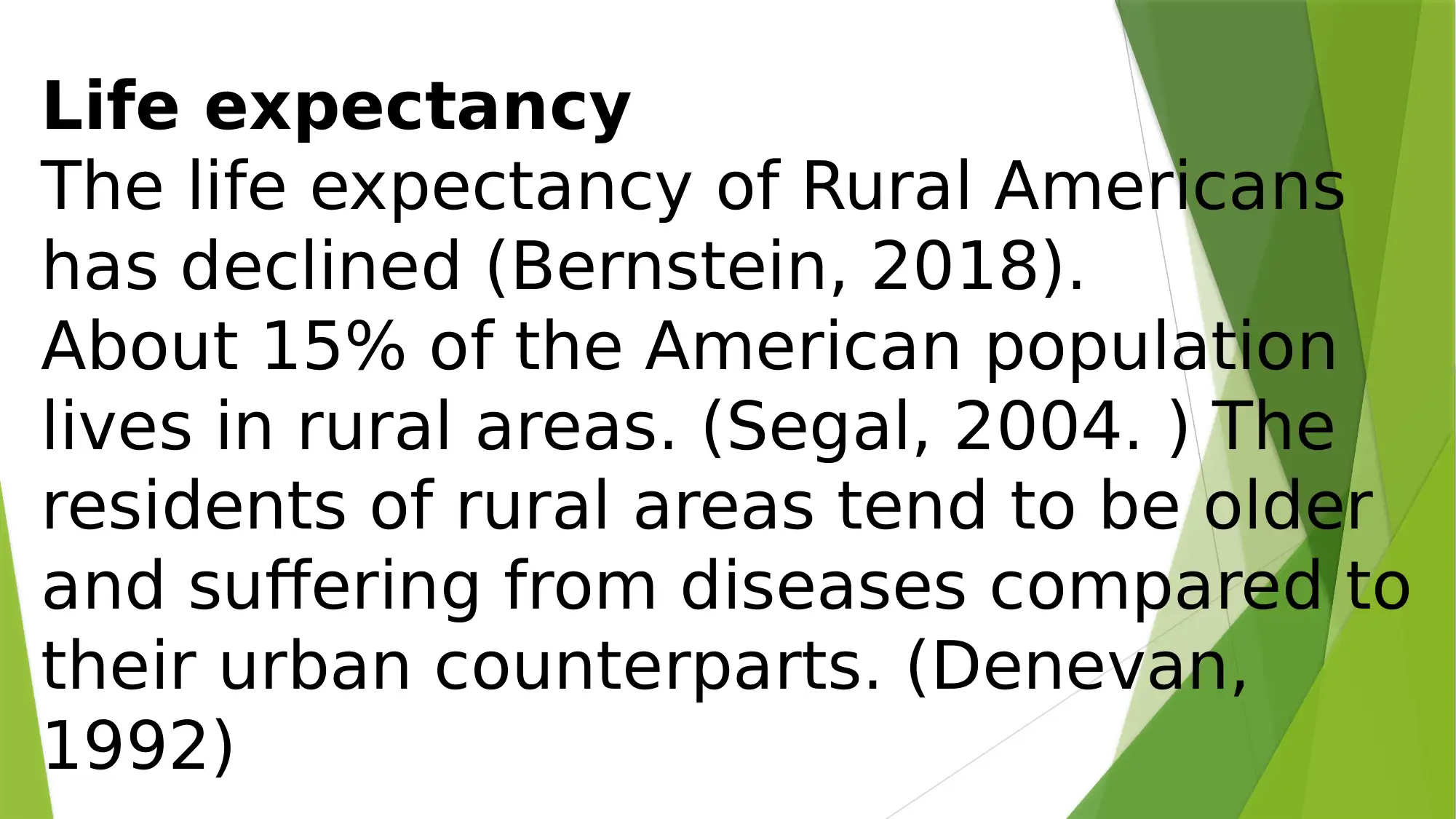
Life expectancy
The life expectancy of Rural Americans
has declined (Bernstein, 2018).
About 15% of the American population
lives in rural areas. (Segal, 2004. ) The
residents of rural areas tend to be older
and suffering from diseases compared to
their urban counterparts. (Denevan,
1992)
The life expectancy of Rural Americans
has declined (Bernstein, 2018).
About 15% of the American population
lives in rural areas. (Segal, 2004. ) The
residents of rural areas tend to be older
and suffering from diseases compared to
their urban counterparts. (Denevan,
1992)
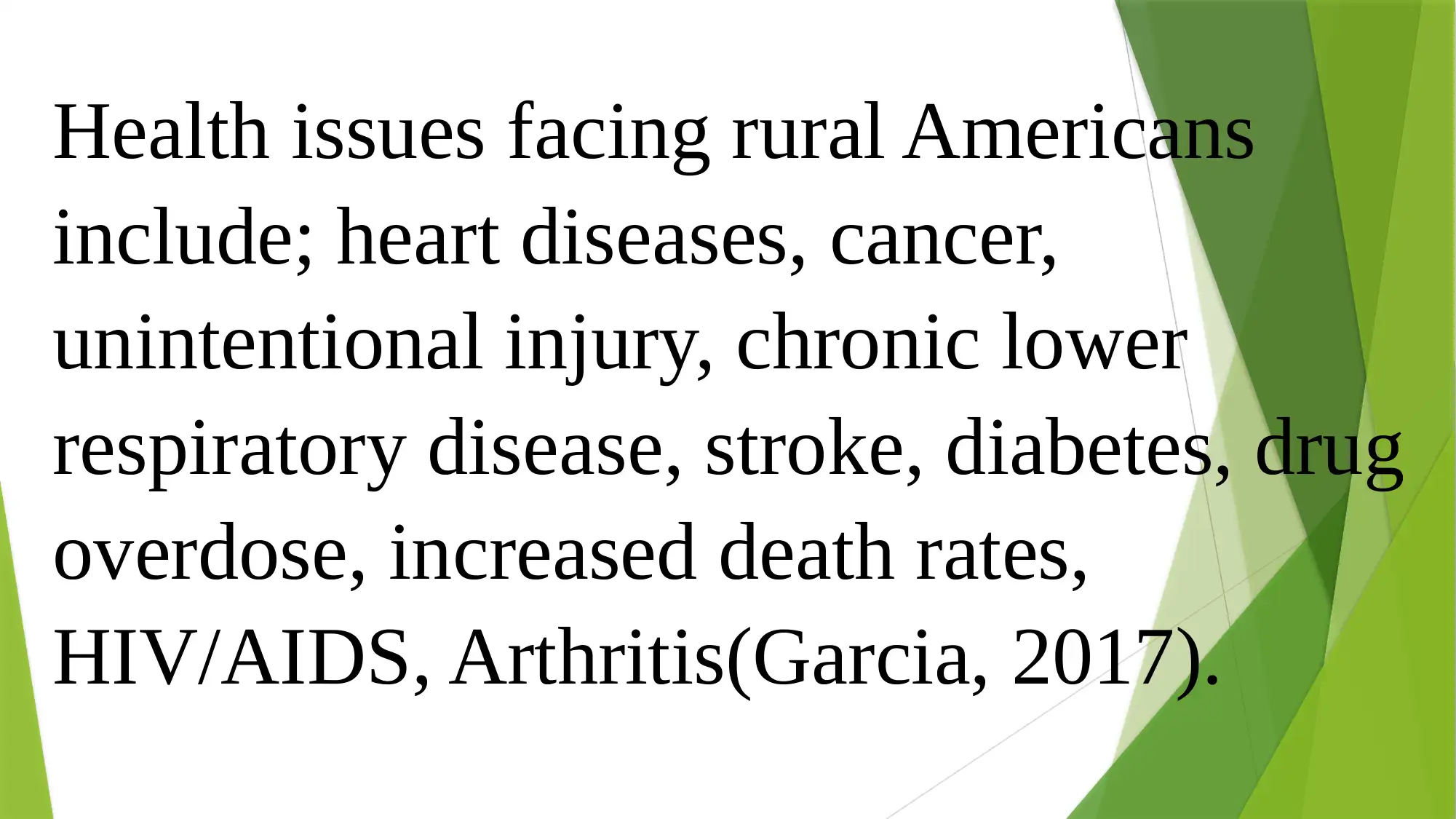
Health issues facing rural Americans
include; heart diseases, cancer,
unintentional injury, chronic lower
respiratory disease, stroke, diabetes, drug
overdose, increased death rates,
HIV/AIDS, Arthritis(Garcia, 2017).
include; heart diseases, cancer,
unintentional injury, chronic lower
respiratory disease, stroke, diabetes, drug
overdose, increased death rates,
HIV/AIDS, Arthritis(Garcia, 2017).
⊘ This is a preview!⊘
Do you want full access?
Subscribe today to unlock all pages.

Trusted by 1+ million students worldwide
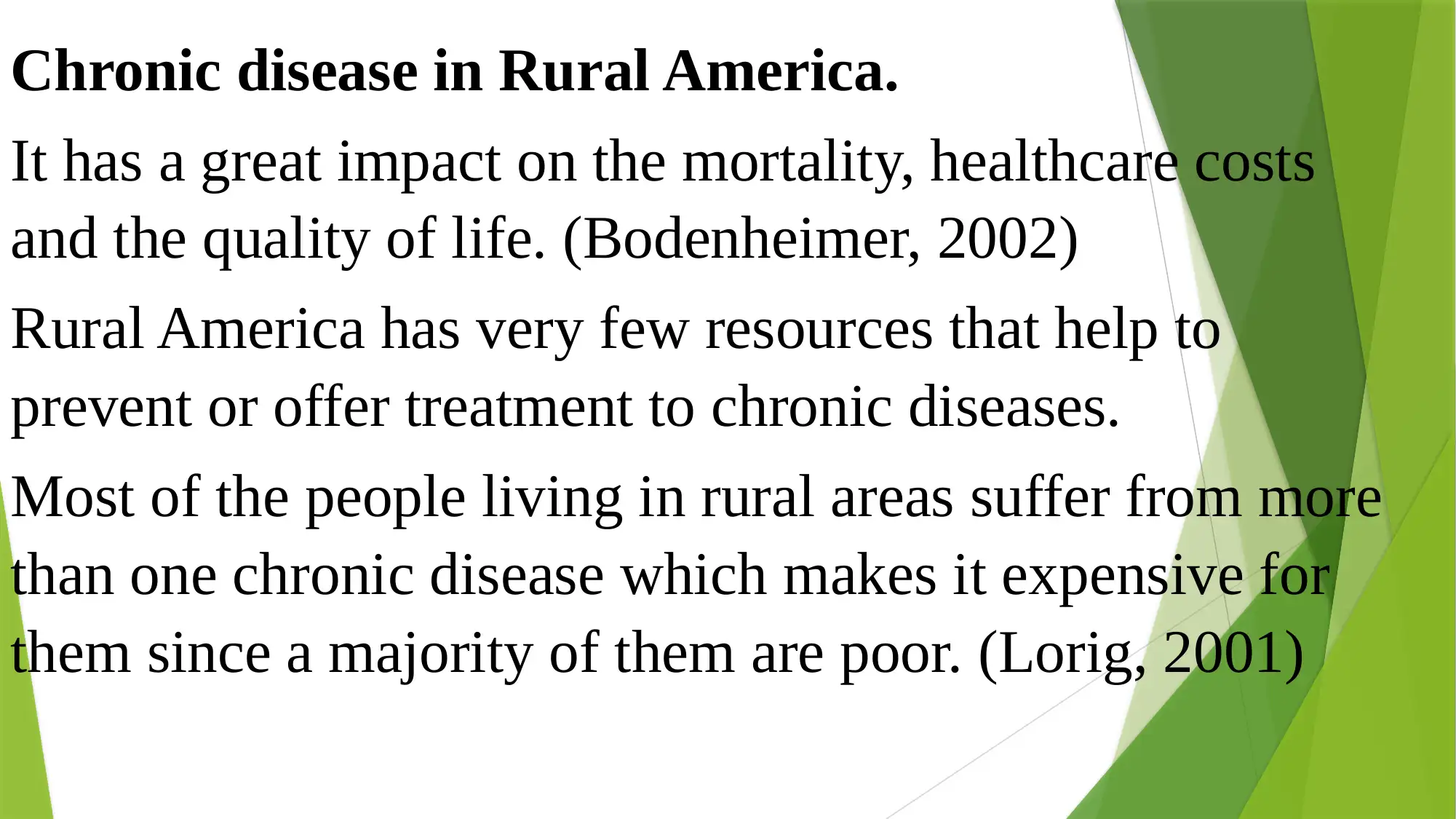
Chronic disease in Rural America.
It has a great impact on the mortality, healthcare costs
and the quality of life. (Bodenheimer, 2002)
Rural America has very few resources that help to
prevent or offer treatment to chronic diseases.
Most of the people living in rural areas suffer from more
than one chronic disease which makes it expensive for
them since a majority of them are poor. (Lorig, 2001)
It has a great impact on the mortality, healthcare costs
and the quality of life. (Bodenheimer, 2002)
Rural America has very few resources that help to
prevent or offer treatment to chronic diseases.
Most of the people living in rural areas suffer from more
than one chronic disease which makes it expensive for
them since a majority of them are poor. (Lorig, 2001)
Paraphrase This Document
Need a fresh take? Get an instant paraphrase of this document with our AI Paraphraser
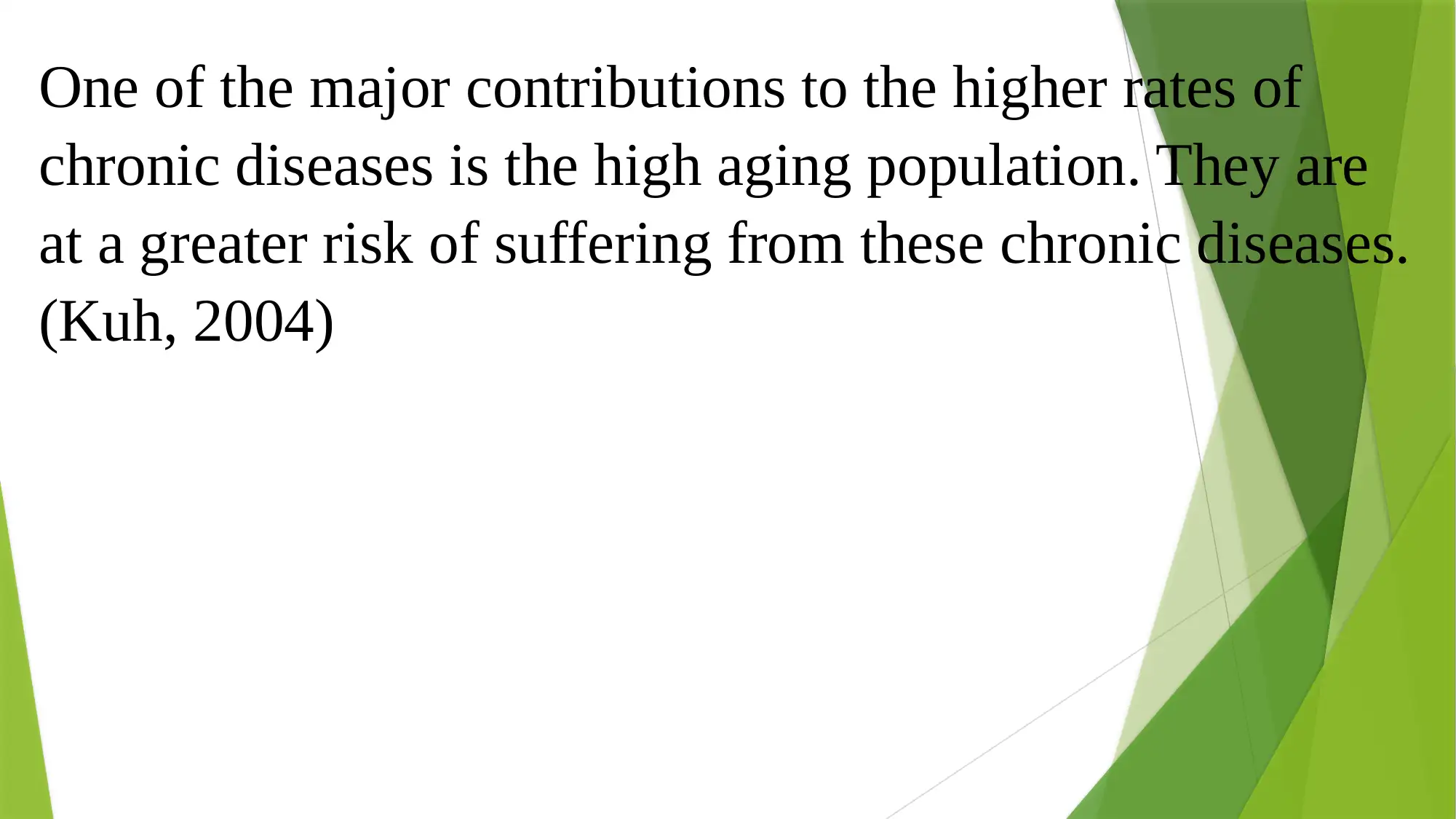
One of the major contributions to the higher rates of
chronic diseases is the high aging population. They are
at a greater risk of suffering from these chronic diseases.
(Kuh, 2004)
chronic diseases is the high aging population. They are
at a greater risk of suffering from these chronic diseases.
(Kuh, 2004)
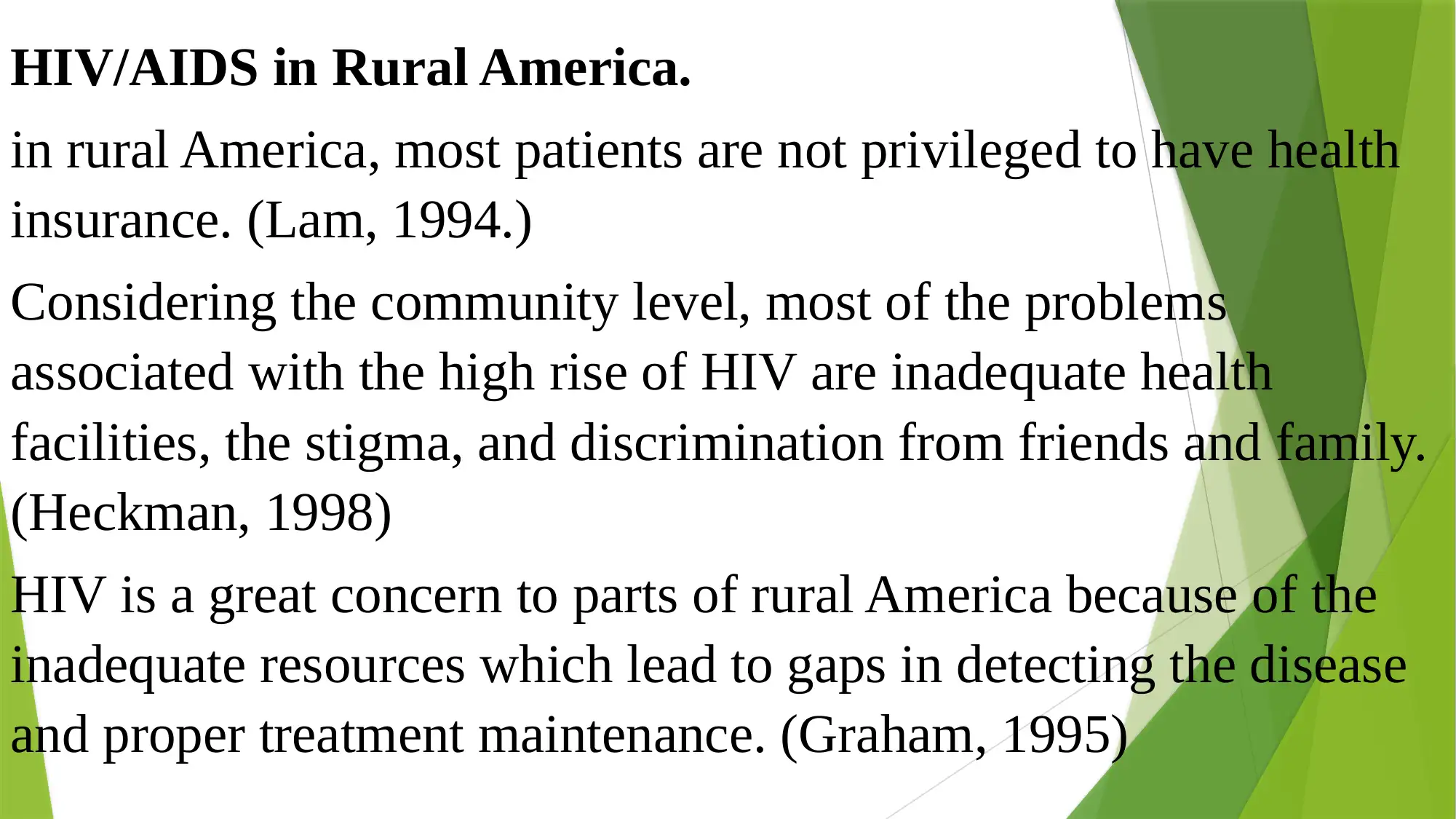
HIV/AIDS in Rural America.
in rural America, most patients are not privileged to have health
insurance. (Lam, 1994.)
Considering the community level, most of the problems
associated with the high rise of HIV are inadequate health
facilities, the stigma, and discrimination from friends and family.
(Heckman, 1998)
HIV is a great concern to parts of rural America because of the
inadequate resources which lead to gaps in detecting the disease
and proper treatment maintenance. (Graham, 1995)
in rural America, most patients are not privileged to have health
insurance. (Lam, 1994.)
Considering the community level, most of the problems
associated with the high rise of HIV are inadequate health
facilities, the stigma, and discrimination from friends and family.
(Heckman, 1998)
HIV is a great concern to parts of rural America because of the
inadequate resources which lead to gaps in detecting the disease
and proper treatment maintenance. (Graham, 1995)
⊘ This is a preview!⊘
Do you want full access?
Subscribe today to unlock all pages.

Trusted by 1+ million students worldwide
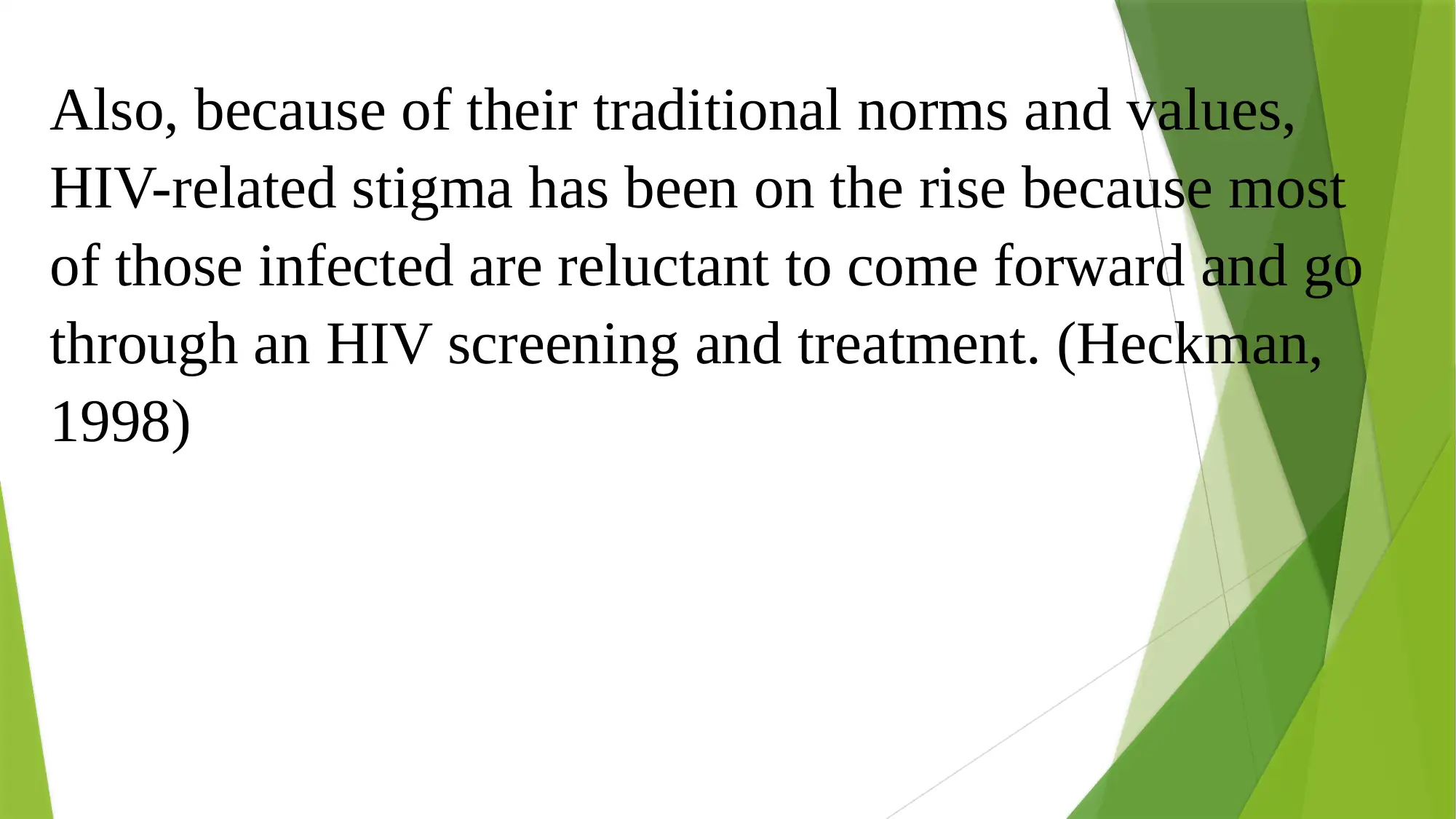
Also, because of their traditional norms and values,
HIV-related stigma has been on the rise because most
of those infected are reluctant to come forward and go
through an HIV screening and treatment. (Heckman,
1998)
HIV-related stigma has been on the rise because most
of those infected are reluctant to come forward and go
through an HIV screening and treatment. (Heckman,
1998)
Paraphrase This Document
Need a fresh take? Get an instant paraphrase of this document with our AI Paraphraser
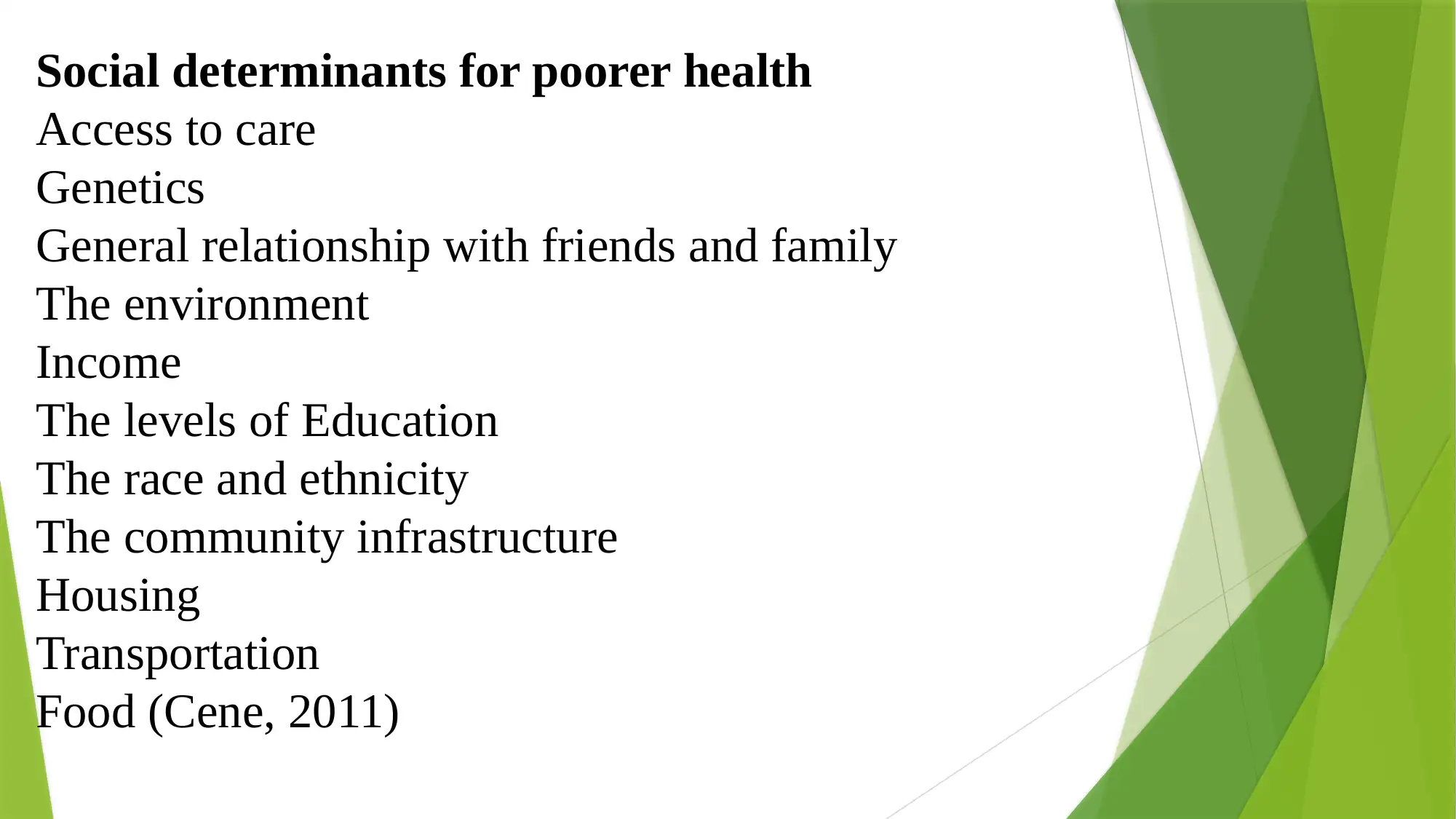
Social determinants for poorer health
Access to care
Genetics
General relationship with friends and family
The environment
Income
The levels of Education
The race and ethnicity
The community infrastructure
Housing
Transportation
Food (Cene, 2011)
Access to care
Genetics
General relationship with friends and family
The environment
Income
The levels of Education
The race and ethnicity
The community infrastructure
Housing
Transportation
Food (Cene, 2011)
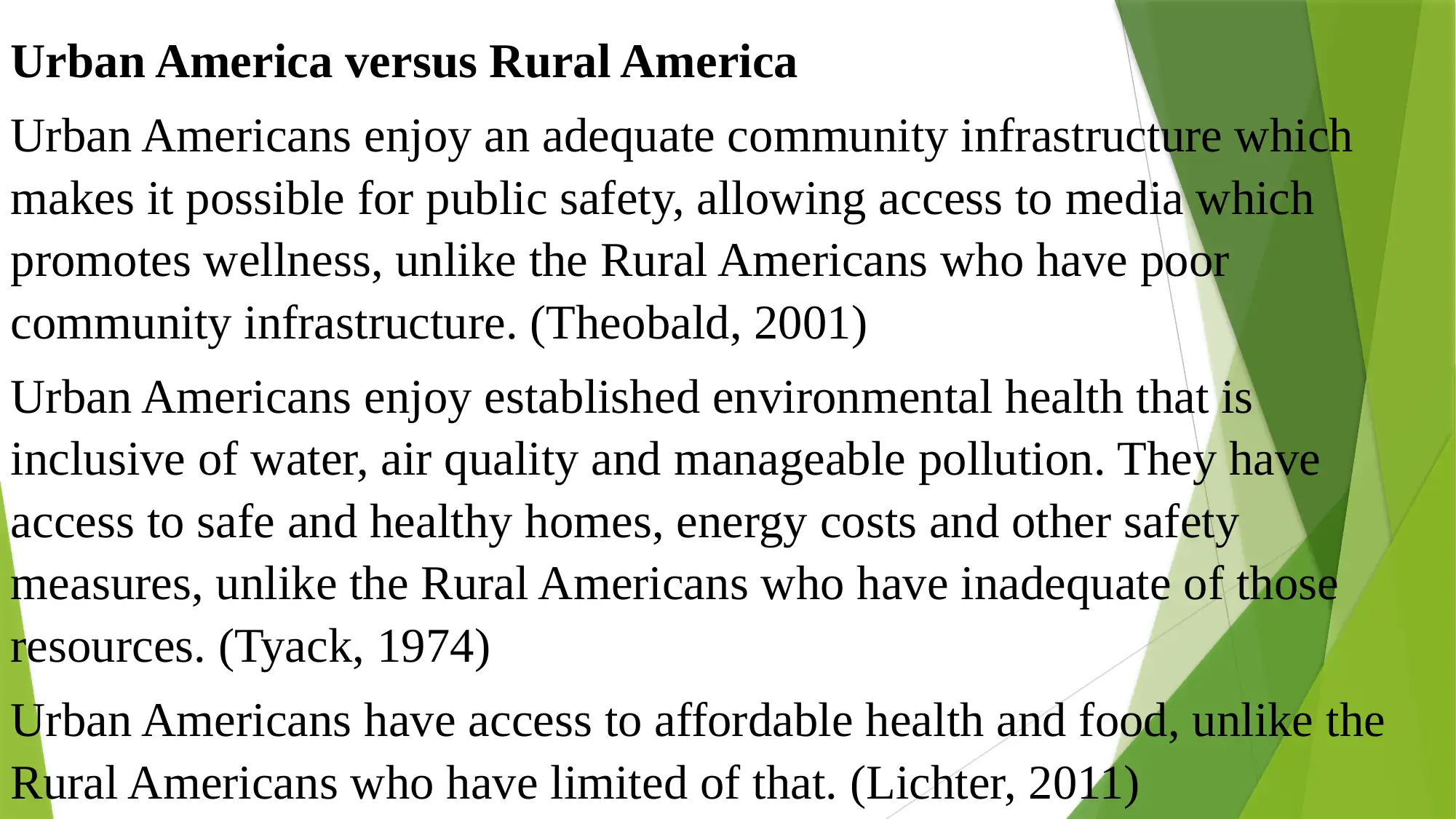
Urban America versus Rural America
Urban Americans enjoy an adequate community infrastructure which
makes it possible for public safety, allowing access to media which
promotes wellness, unlike the Rural Americans who have poor
community infrastructure. (Theobald, 2001)
Urban Americans enjoy established environmental health that is
inclusive of water, air quality and manageable pollution. They have
access to safe and healthy homes, energy costs and other safety
measures, unlike the Rural Americans who have inadequate of those
resources. (Tyack, 1974)
Urban Americans have access to affordable health and food, unlike the
Rural Americans who have limited of that. (Lichter, 2011)
Urban Americans enjoy an adequate community infrastructure which
makes it possible for public safety, allowing access to media which
promotes wellness, unlike the Rural Americans who have poor
community infrastructure. (Theobald, 2001)
Urban Americans enjoy established environmental health that is
inclusive of water, air quality and manageable pollution. They have
access to safe and healthy homes, energy costs and other safety
measures, unlike the Rural Americans who have inadequate of those
resources. (Tyack, 1974)
Urban Americans have access to affordable health and food, unlike the
Rural Americans who have limited of that. (Lichter, 2011)
⊘ This is a preview!⊘
Do you want full access?
Subscribe today to unlock all pages.

Trusted by 1+ million students worldwide
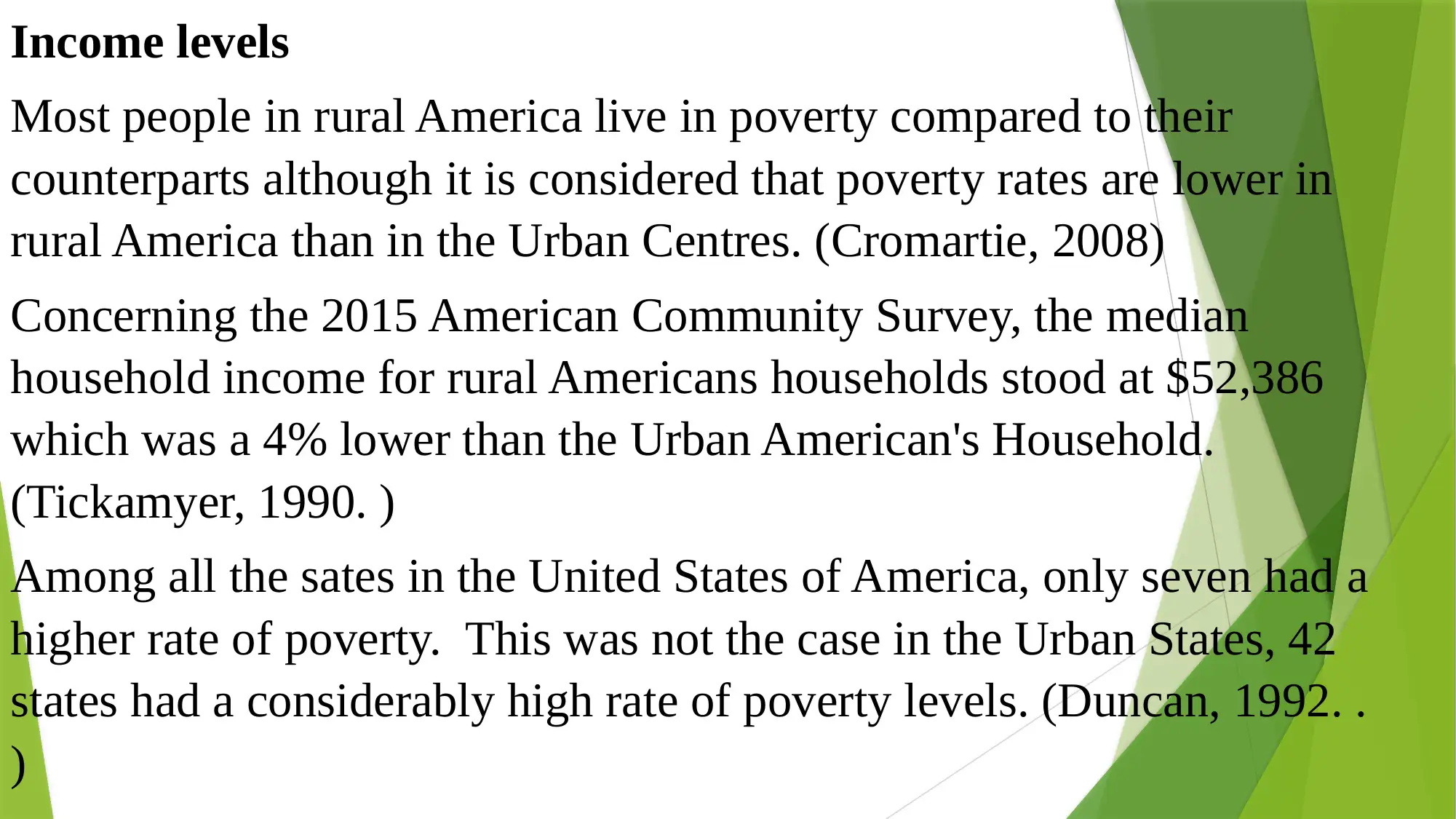
Income levels
Most people in rural America live in poverty compared to their
counterparts although it is considered that poverty rates are lower in
rural America than in the Urban Centres. (Cromartie, 2008)
Concerning the 2015 American Community Survey, the median
household income for rural Americans households stood at $52,386
which was a 4% lower than the Urban American's Household.
(Tickamyer, 1990. )
Among all the sates in the United States of America, only seven had a
higher rate of poverty. This was not the case in the Urban States, 42
states had a considerably high rate of poverty levels. (Duncan, 1992. .
)
Most people in rural America live in poverty compared to their
counterparts although it is considered that poverty rates are lower in
rural America than in the Urban Centres. (Cromartie, 2008)
Concerning the 2015 American Community Survey, the median
household income for rural Americans households stood at $52,386
which was a 4% lower than the Urban American's Household.
(Tickamyer, 1990. )
Among all the sates in the United States of America, only seven had a
higher rate of poverty. This was not the case in the Urban States, 42
states had a considerably high rate of poverty levels. (Duncan, 1992. .
)
Paraphrase This Document
Need a fresh take? Get an instant paraphrase of this document with our AI Paraphraser
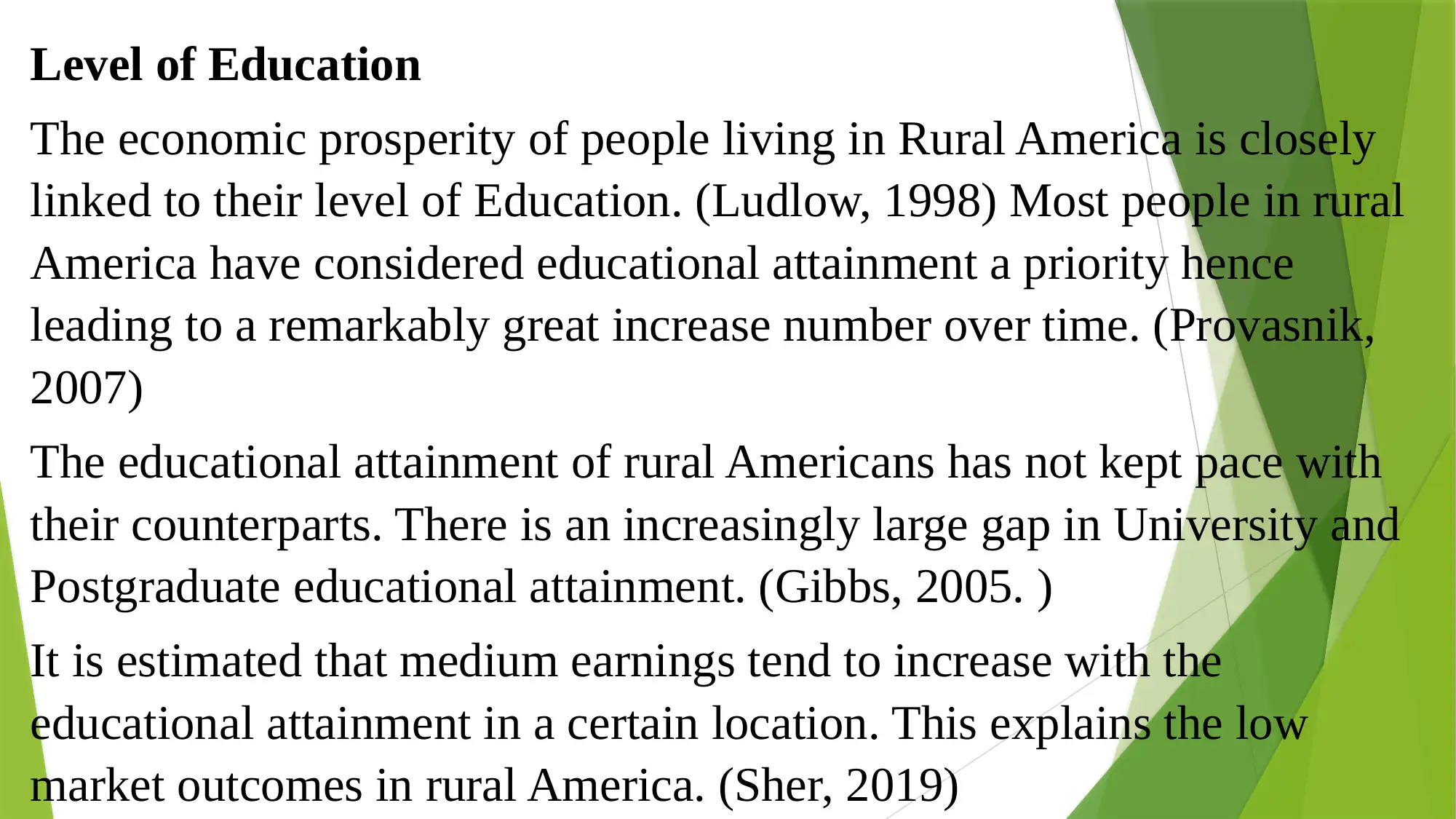
Level of Education
The economic prosperity of people living in Rural America is closely
linked to their level of Education. (Ludlow, 1998) Most people in rural
America have considered educational attainment a priority hence
leading to a remarkably great increase number over time. (Provasnik,
2007)
The educational attainment of rural Americans has not kept pace with
their counterparts. There is an increasingly large gap in University and
Postgraduate educational attainment. (Gibbs, 2005. )
It is estimated that medium earnings tend to increase with the
educational attainment in a certain location. This explains the low
market outcomes in rural America. (Sher, 2019)
The economic prosperity of people living in Rural America is closely
linked to their level of Education. (Ludlow, 1998) Most people in rural
America have considered educational attainment a priority hence
leading to a remarkably great increase number over time. (Provasnik,
2007)
The educational attainment of rural Americans has not kept pace with
their counterparts. There is an increasingly large gap in University and
Postgraduate educational attainment. (Gibbs, 2005. )
It is estimated that medium earnings tend to increase with the
educational attainment in a certain location. This explains the low
market outcomes in rural America. (Sher, 2019)
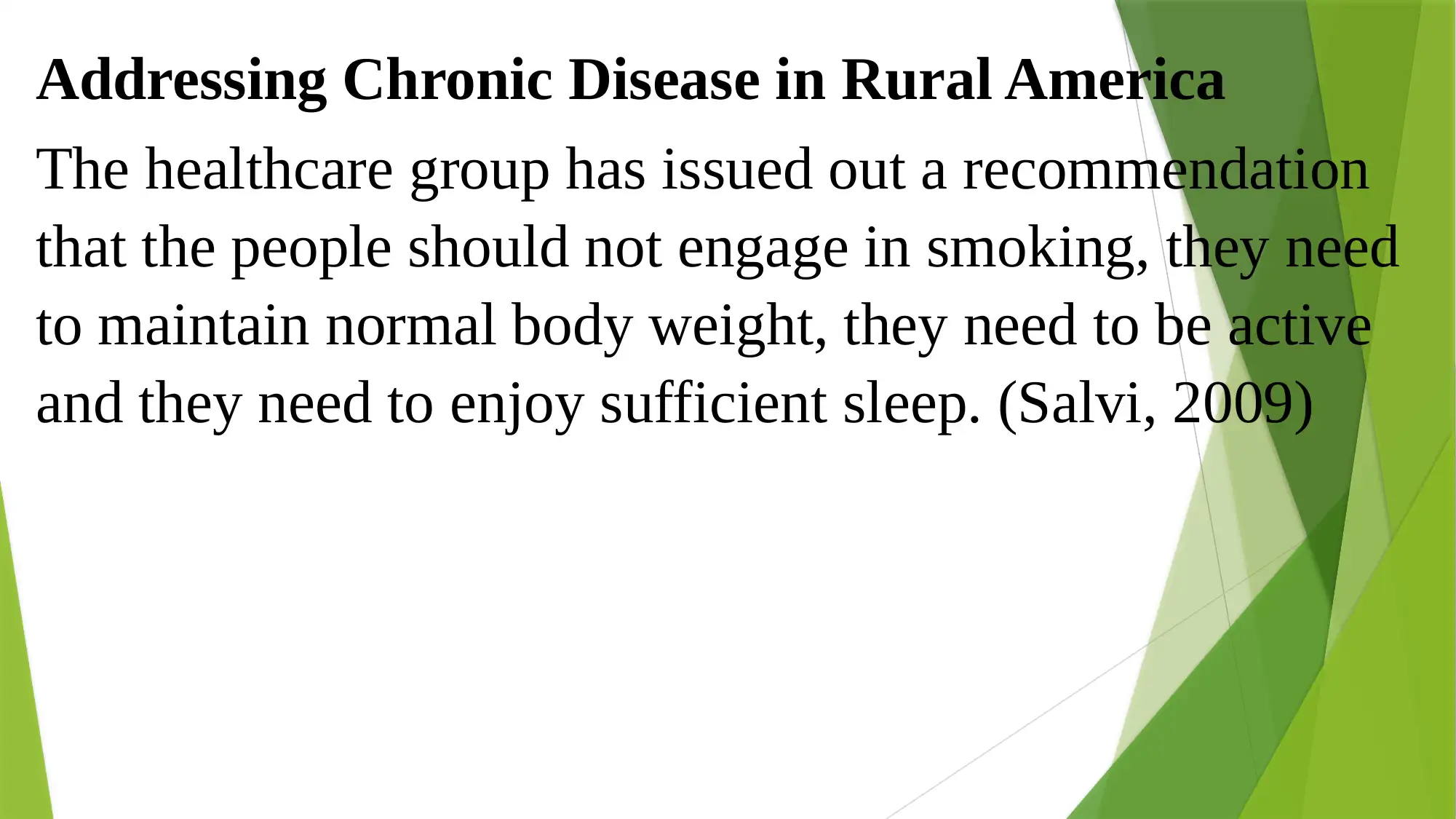
Addressing Chronic Disease in Rural America
The healthcare group has issued out a recommendation
that the people should not engage in smoking, they need
to maintain normal body weight, they need to be active
and they need to enjoy sufficient sleep. (Salvi, 2009)
The healthcare group has issued out a recommendation
that the people should not engage in smoking, they need
to maintain normal body weight, they need to be active
and they need to enjoy sufficient sleep. (Salvi, 2009)
⊘ This is a preview!⊘
Do you want full access?
Subscribe today to unlock all pages.

Trusted by 1+ million students worldwide
1 out of 19
Related Documents
Your All-in-One AI-Powered Toolkit for Academic Success.
+13062052269
info@desklib.com
Available 24*7 on WhatsApp / Email
![[object Object]](/_next/static/media/star-bottom.7253800d.svg)
Unlock your academic potential
Copyright © 2020–2026 A2Z Services. All Rights Reserved. Developed and managed by ZUCOL.




